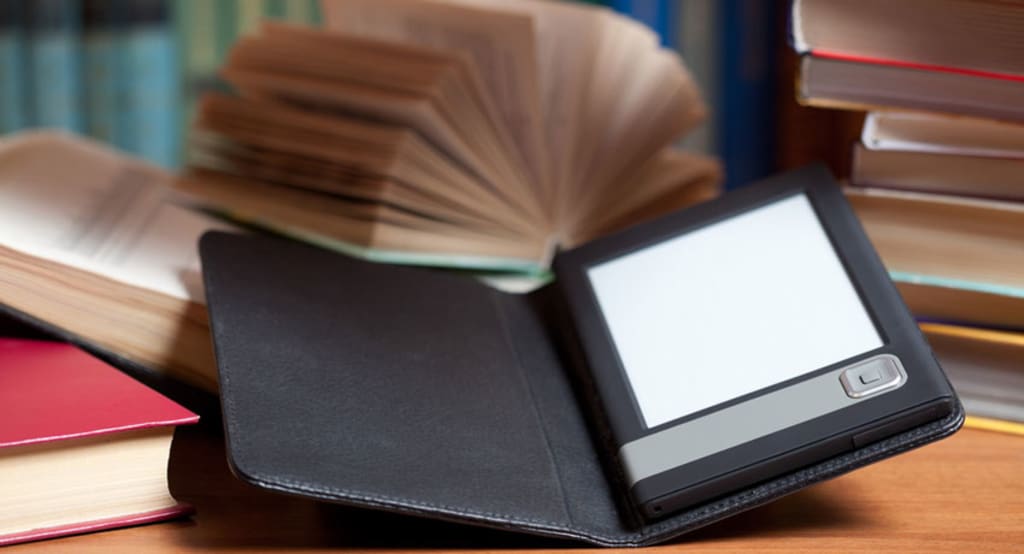Valuing Literature in all its Forms
How the Digitization of Books Enhances Literature

There is a common misconception that Kindles, Nook Books, Kobos and other e-readers are somehow killing the market of books published in print. People tend to take a side on whether they appreciate the ability to carry lots of reading material in a single device, or if a precious hardback book can be pried from their cold, dead hands.
There seem to be three main arguments for why electronic books are vilified:
1) Some believe that the price of an e-book not only devalues the book itself, but hurts the author. Reduced prices mean less revenue.
2) Some believe that printed books are sacred, and they should not be remodeled into electronic versions. That the only way you can properly own a book is if it is in print.
3) There is an aesthetic to be maintained with books that is entirely lost in electronic versions. They just aren't the same.
However, it is my belief that the pricing of e-books, the accessibility of them, and their convenience enhances the value and joy of reading literature within the public. Let me tell you why.

Pricing
Traditionally, the price of e-books is much less than bound books. Hardback books are often priced at around $20.00 or more depending on the size and length of the novel; Paperbacks can range from $8.00 to $15.00. For those hard-pressed for cash, they may only be able to limit themselves to buying one or two books at a time. On the other hand, e-books can range anywhere from $2.00 to $10.00, and if your purchases are on the lower end of that scale, you could buy six or seven books at once! Who doesn't like buying several books?
There is a belief that cheaper books hurt the author's revenues, so logically, e-books are the enemy of an author's paycheck. But this isn't the case. There are so many variables in play for how authors are paid. Royalties will vary in percentages based on the contract an author has with their publisher. If other services and companies were involved in the publishing process, a percentage of royalties must also go to them. Thomas N. Ellsworth, president and cofounder of Premier Digital Publishing, admits that in printed publishing, the author may only earn 20% of their book royalties, or sometimes as little as 10%.
In fact, authors have a better chance of earning more money with digital publishing. In digital publishing the book is not printed, which erases several services from being used that could potentially lessen the royalty percentage an author earns. Not only is it more likely that authors will earn more in sales from e-books, but those price-sensitive consumers are far more likely to purchase those e-books, and return to buy more at the same low price.
As for the belief that a cheaper price cheapens the literature itself... This idea is kin to long ago, when people of high society thought that poetry could not be written by or for the common class, because of its supreme value. Commoners would never be able to exhibit the appreciation such literature deserved. High Culture was painfully exclusive then, and it is painfully exclusive now. Jack Thomas, director of the London Book Fair, says that stories and knowledge are aspects of books that still need to be curated. Just because something was written hundreds of years ago and is categorized as "Classic Literature," does not mean that you're only worthy to read it if you can shell out the money for it. Literature should be easily accessible to everyone, including in its prices.

Accessibility
I love the sensation of holding a book in my hands and feeling the texture of the pages, but I think it is something that I, and so many others, can easily take for granted. Certain physical disabilities can make it difficult for some to hold a book, or turn a page, much less read it. Those with failing eyesight may struggle with tiny print. There are copies of books in braille for the blind, and large print books are available, but these variations of print are few and far between, and not all books are published with these options.
E-readers are an incredible option for those book-lovers with low mobility. They often have customization in font, type size, and contrasting modes where the color of the text and background can be changed for easier reading. Some tablets, such as the Amazon Fire, offer text-to-speech options for those visually impaired. IPads, iPhones, and other Android tablets also offer synthetic voices on their devices for free, and all of these platforms have apps where you can read or listen to books you have downloaded, purchased, or found for free.
Without the option of electronic reading, some would choose not to read at all, simply because it is too physically difficult for them. To say that a person isn't really reading if it isn't a physical copy is elitism and ableism at its most subtle. In the same way that people are provided aids to navigate daily life with ease, e-readers are the best aid when a physical book is not an option.

Convenience
Imagine that you are taking a road trip. You are taking a train to a location you've always wanted to visit, and you have the perfect book that is going to accompany your journey. Imagine sitting in your booth as the train trundles along, bumping rhythmically against the tracks. You flip pages quietly, resting your cheek in your hand, and your smile grows against your palm as the book reaches it's climax. Scenery rushes past your head in a blur of greens and browns. It's so picturesque.
But if you are a speed reader like me, and you have a long trip ahead of you, you're bound to finish that perfect book and immediately want another. The thought of bringing multiple books that will weigh down your travel bag is such a depressing thought. My shoulder already hurts from the mental image. The thought of slipping a single, thin, 7" screen device in my purse, however, is a no-brainer. And it isn't just leisurely materials that e-readers can house.
Most e-readers support various file types, so all of your textbooks, magazines, or the latest issue of the Wall Street Journal is just a click away. Even those PDFs you downloaded to support your doctoral thesis will fit. E-readers offer a variety of storage as well, so if this is something you just want to have for moments on the go and not as something to replace your library, there is an option for everyone and their specific circumstances.
It is important to remember that everyone experiences reading differently. Some enjoy physical copies, some prefer or rely on electronic versions, and some prefer to listen to books rather than read them. Audible has grown as a publishing format, and has remained popular among the reading community ever since it was founded in 1995. Most e-readers even support Audible, so all styles of reading can be housed on the same device.
Takeaway
Personally, I am always going to favor printed books above using e-readers. I love flipping through a well-loved paperback, stroking glossy finishes of hardbacks, and adding books to my collection. I dream of having a library in my house one day with shelves from floor to ceiling, and one of those gorgeous wooden ladders I can use to dramatically slide from one side of the room to the other. I like to imagine how I will organize them, I like taking pictures of them, I like their weight, their smell, their ability to hold memories as well as stories.
But all of that doesn't mean I will turn my nose up at electronic versions of those same stories. I have bought electronic versions of books that I ended up loving so much, I bought the physical copies too. In fact, I own a Nook Book. It's over a decade old, but I learned long ago that it was a lot easier to lug a backpack around with my e-reader and maybe one or two paperbacks, than the ten or so physical books I needed to keep me occupied on long road trips. (This is not an exaggeration. The drive from Texas to Indiana seemed never-ending as a child.)
If you prefer physical books over electronic ones for the aesthetic, that's fine! Go for it! Live your truth! But don't make an enemy out of the written word because of incorrect information. The value of something does not change because of price-tags or formats. Literature, in whatever form it presents itself, should be shared and enjoyed.
Yes, I believe books are sacred, but books are more than the bindings, than the cover pages, than the illustrations. It is the stories that are sacred, and it doesn't really matter if they are preserved in pristine first-editions, or in PDF files on a thumb drive in your pocket.
What matters, is that the stories live on.
About the Creator
M.G. Sprinkle
Aspiring author, killer of houseplants.
Enjoyed the story? Support the Creator.
Subscribe for free to receive all their stories in your feed. You could also pledge your support or give them a one-off tip, letting them know you appreciate their work.






Comments
There are no comments for this story
Be the first to respond and start the conversation.